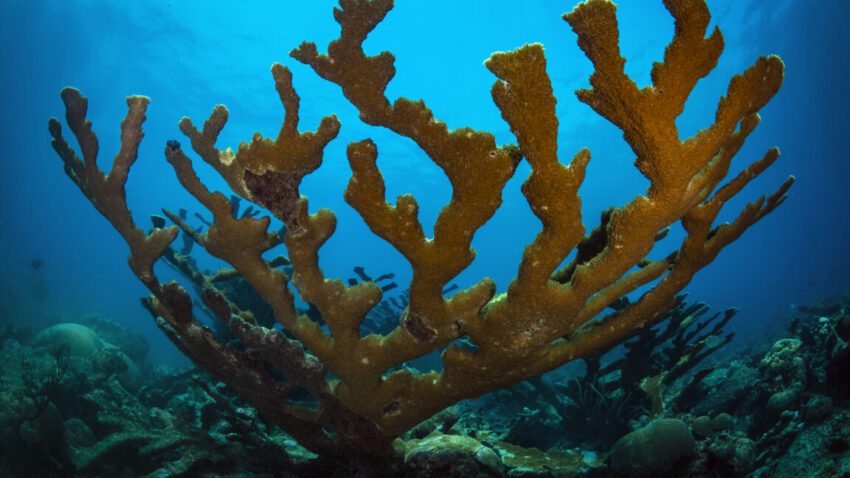
corals survived past climate changes by retreating Recent research highlights the alarming impact of climate change on coral reefs, revealing that two species of Acropora corals in the Florida Reef have reached a state of “functional extinction” due to a marine heat wave in 2023.
corals survived past climate changes by retreating
The Current Crisis Facing Coral Reefs
The Florida Reef, which extends from Dry Tortugas National Park to Miami, has been a vital ecosystem supporting diverse marine life. However, the recent marine heat wave has had devastating effects on its coral populations. Scientists report that two species of Acropora, known for their role in reef-building, have suffered catastrophic declines. Ross Cunning, a coral biologist at the John G. Shedd Aquarium, stated, “At this point, we do not think there’s much of a chance for natural recovery—their numbers are so low that successful reproduction is incredibly unlikely.” This stark assessment underscores the urgent need for intervention and conservation efforts.
The Concept of Functional Extinction
Functional extinction occurs when a species’ population is so diminished that it can no longer sustain itself through natural reproduction. In the case of the Acropora corals, their numbers have plummeted to a level where the likelihood of successful reproduction is nearly nonexistent. This situation raises critical questions about the future of coral ecosystems, which are already under significant stress from various environmental factors.
Historical Context of Coral Resilience
Corals have a long history of surviving climate changes, having faced numerous extinction events over the past 460 million years. During these times, corals have demonstrated remarkable resilience, often retreating to deeper waters where conditions may be more favorable. This historical context provides a glimmer of hope; however, the current rate of climate change poses unprecedented challenges that may hinder their ability to recover.
Past Climate Events and Coral Adaptation
Throughout geological history, corals have adapted to significant shifts in climate and ocean conditions. For instance, during the Paleocene-Eocene Thermal Maximum (PETM) around 55 million years ago, corals managed to survive extreme temperatures and acidification by migrating to deeper waters. This ability to adapt has been crucial for their survival, allowing them to recolonize areas that were previously inhospitable.
However, the current climate crisis is characterized by rapid changes that exceed the natural adaptive capacity of many coral species. The increasing frequency and intensity of marine heat waves, ocean acidification, and pollution are compounding the threats to coral ecosystems. As a result, the historical resilience of corals may not be sufficient to withstand the current environmental pressures.
The Implications of Coral Decline
The decline of coral reefs has far-reaching implications, not only for marine biodiversity but also for human communities that rely on these ecosystems for their livelihoods. Coral reefs provide essential services, including coastal protection, tourism revenue, and habitat for numerous marine species. The loss of coral species like Acropora could disrupt these services, leading to economic and ecological consequences.
Impact on Marine Biodiversity
Coral reefs are often referred to as the “rainforests of the sea” due to their rich biodiversity. They support approximately 25% of all marine species, including fish, invertebrates, and other marine organisms. The decline of coral species can lead to a cascade of effects throughout the marine food web, potentially resulting in the loss of species that depend on corals for habitat and food.
Economic Consequences for Coastal Communities
Many coastal communities depend on healthy coral reefs for their economies. Tourism, fishing, and recreational activities are heavily reliant on vibrant coral ecosystems. The degradation of these reefs can lead to significant economic losses, affecting livelihoods and food security for millions of people worldwide. As coral populations dwindle, the associated economic benefits also diminish, creating a cycle of decline that is difficult to reverse.
Stakeholder Reactions and Conservation Efforts
The alarming findings regarding the functional extinction of Acropora corals have prompted reactions from various stakeholders, including scientists, conservationists, and policymakers. Many experts are calling for immediate action to protect remaining coral populations and promote recovery efforts.
Scientific Community Response
Scientists are increasingly advocating for research into coral resilience and adaptation strategies. Understanding how corals have survived past climate events can inform current conservation efforts. Researchers are exploring techniques such as selective breeding and assisted evolution to enhance the resilience of coral species to climate change. These methods aim to develop corals that can withstand higher temperatures and increased acidification.
Policy and Conservation Initiatives
Policymakers are also being urged to implement stronger protections for coral reefs. This includes establishing marine protected areas, regulating fishing practices, and reducing pollution from land-based sources. Collaborative efforts between governments, NGOs, and local communities are essential to create comprehensive conservation strategies that address the multifaceted threats to coral reefs.
The Future of Coral Reefs
The future of coral reefs remains uncertain, particularly in light of the ongoing climate crisis. While historical evidence suggests that corals can recover from past climate changes, the current rate of environmental degradation poses significant challenges. It is unclear whether corals will be able to adapt quickly enough to survive the unprecedented conditions they face today.
Potential for Recovery
Despite the grim outlook, there is still potential for coral recovery if immediate action is taken. Conservation efforts focused on habitat restoration, pollution reduction, and climate change mitigation can create conditions that support coral resilience. Additionally, public awareness and education about the importance of coral reefs can foster community engagement in conservation initiatives.
Long-Term Strategies for Coral Conservation
Long-term strategies for coral conservation must prioritize sustainable practices and climate action. This includes reducing greenhouse gas emissions, protecting marine habitats, and promoting sustainable tourism and fishing practices. By addressing the root causes of coral decline, stakeholders can work towards a more sustainable future for coral reefs and the ecosystems they support.
Conclusion
The functional extinction of Acropora corals in the Florida Reef serves as a stark reminder of the urgent challenges facing coral ecosystems worldwide. While corals have demonstrated remarkable resilience throughout history, the current climate crisis poses unprecedented threats that may hinder their ability to recover. Immediate action is essential to protect remaining coral populations and promote conservation efforts that can support their survival. The fate of coral reefs is intricately linked to the health of our oceans and the well-being of coastal communities, making it imperative to prioritize their conservation in the face of climate change.
Source: Original report
Was this helpful?
Last Modified: November 12, 2025 at 11:35 pm
0 views















